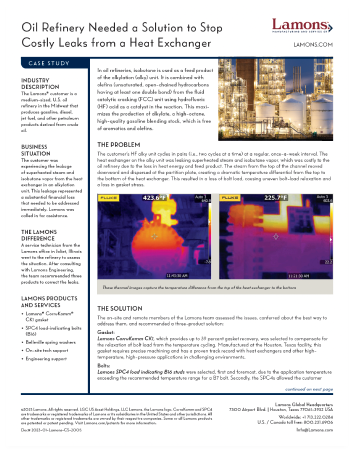In oil refineries, isobutane is used as a feed product of the alkylation (alky) unit. It is combined with olefins (unsaturated, open-chained hydrocarbons having at least one double bond) from the fluid catalytic cracking (FCC) unit using hydrofluoric (HF) acid as a catalyst in the reaction. This maximizes the production of alkylate, a high-octane, high-quality gasoline blending stock, which is free of aromatics and olefins.

Lasting Business Benefits
The success of this product solution allowed the customer to check bolt loads and re-torque the studs as needed. They were able to keep the exchangers running online without downtime until the next turnaround. In all bolted-flange connections, the goal is applying and maintaining clamping load.
This scenario demonstrates the benefits of a highly engineered gasket, Lamons CorruKamm, that can recover from temperature cycles. It also shows the value-added benefits of being able to monitor bolt loads to verify accuracy, plus or minus five percent. This leads to less downtime, greater cost savings, and a more efficient unit in operation.
Industry Description
The Lamons® customer is a medium-sized, U.S. oil refinery in the Midwest that produces gasoline, diesel, jet fuel, and other petroleum products derived from crude oil.
Business Situation
The customer was experiencing the leakage of superheated steam and isobutane vapor from the heat exchanger in an alkylation unit. This leakage represented a substantial financial loss that needed to be addressed immediately. Lamons was called in for assistance.
The Lamons Difference
A service technician from the Lamons office in Joliet, Illinois went to the refinery to assess the situation. After consulting with Lamons Engineering, the team recommended three products to correct the leaks.
Lamons Products and Services
Lamons® CorruKamm® CK1 gasket
SPC4 load-indicating bolts (B16)
Belleville spring washers
On-site tech support
Engineering support
THE PROBLEM
The customer’s HF alky unit cycles in pairs (i.e., two cycles at a time) at a regular, once-a-week interval. The heat exchanger on the alky unit was leaking superheated steam and isobutane vapor, which was costly to the oil refinery due to the loss in heat energy and feed product. The steam from the top of the channel moved downward and dispersed at the partition plate, creating a dramatic temperature differential from the top to the bottom of the heat exchanger. This resulted in a loss of bolt load, causing uneven bolt-load relaxation and a loss in gasket stress.

THE SOLUTION
The on-site and remote members of the Lamons team assessed the issues, conferred about the best way to address them, and recommended a three-product solution:
Gasket: Lamons CorruKamm CK1, which provides up to 39 percent gasket recovery, was selected to compensate for the relaxation of bolt load from the temperature cycling. Manufactured at the Houston, Texas facility, this gasket requires precise machining and has a proven track record with heat exchangers and other high-temperature, high-pressure applications in challenging environments.
Bolts: Lamons SPC4 load indicating B16 studs were selected, first and foremost, due to the application temperature exceeding the recommended temperature range for a B7 bolt. Secondly, the SPC4s allowed the customer to set the studs within five percent, plus or minus, of the ideal bolt load achieved at installation. Lastly, the operator could easily check the bolt load at any time and re-torque them to maintain a uniform clamp load as needed.
Washers: Belleville spring washers were chosen because they helped trap the bolt load, and they were a great compliment to the SPC4 in maintaining the desired uniform gasket stress.
During the installation, the Lamons technician remained on-site to assist and address any questions or concerns.
The CorruKamm CK1 gasket bolted up according to plan, and the SPC4 B16 studs were set at 40 percent of yield strength.
THE RESULTS
Effectively, the Lamons product solution (the CorruKamm CK1, the SPC4 load-indicating studs, and the Belleville spring washers) succeeded in eliminating the superheated steam and isobutane leaks, which greatly enhanced the HF alky unit’s efficiency and performance. The refinery calculated the cost savings from this to be two million USD over a four-to-five-year period.
Additionally, the HF alky maintenance team was able to monitor the bolt loads with the SPC4 mechanical load reader periodically between thermal cycles, allowing them to avoid future leaks.
Lasting Business Benefits
The success of this product solution allowed the customer to check bolt loads and re-torque the studs as needed. They were able to keep the exchangers running online without downtime until the next turnaround. In all bolted-flange connections, the goal is applying and maintaining clamping load.
This scenario demonstrates the benefits of a highly engineered gasket, Lamons CorruKamm, that can recover from temperature cycles. It also shows the value-added benefits of being able to monitor bolt loads to verify accuracy, plus or minus five percent. This leads to less downtime, greater cost savings, and a more efficient unit in operation.










